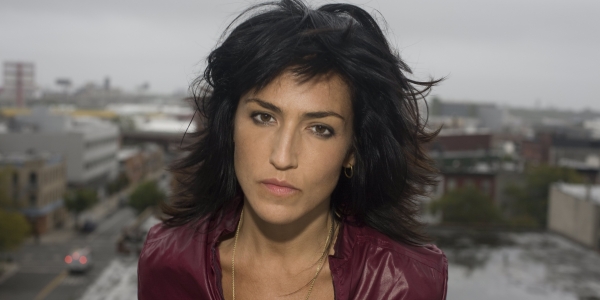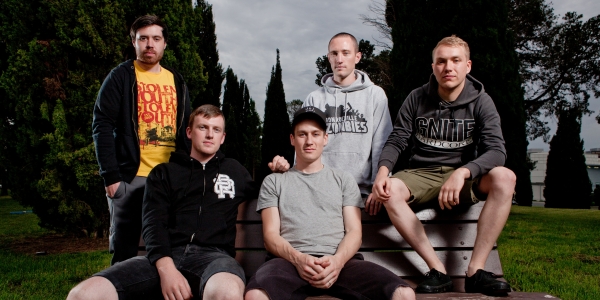“It was a really fun song to write because I wanted to write it like a pop song,” Wasser asserts. “It’s like ‘what am I gonna do – write another bleeding song about trying to get out of my head – no! That’s ridiculous!'” she laughs.
“When I realise that it’s happening, I’m like ‘oh god, there I go again’. I just really wanted to make it fun and feel like I could step out of it, which I can – if I think about it that way. And I know that it happens to so many people.”
Joan As Police Woman’s third album (not including Cover), The Deep Field, is not without its heart-wrenching ballads, though – a standout is the deeply personal and emotional Forever And A Year. “I didn’t know if I was going to be able to sing that song live,” states Wasser with a heartening burst of laughter.
“I get attached to a lot of people and I really feel like I love a lot of people, even when loving them sometimes doesn’t necessarily do me so much good. The thing that is always left over is that feeling that you shared with them – even if it’s just a moment, there’s this special connection that you have with someone. It may be one ten-minute moment in time, but whatever happens afterwards or if you don’t really see this person very often or ever again, that moment still exists in time and it doesn’t ever go away. And it’s still just as special as it was.”
A record that Wasser describes as her most open and joyous, there’s a spirited yearning to The Deep Field that’s empowering. “I always come back to listening to Stevie Wonder because he really writes songs that encapsulate the whole experience of being human, but the outcome of that is a sense of joy,” Wasser conveys. “And when you listen to Stevie sing, you’re not questioning whether he feels joy or not – he is feeling joy; you can hear it in his sound and his voice.
“I really wanted to try to figure out how to do that myself, because I’ve written a certain amount of songs about longing or about feeling out of place, and I really wanted a more universal encapsulation of what it is to be human rather than just through the sorrow aspects.
“I definitely revised the music – and the lyrics especially – over and over and over again, because it’s a little bit trickier to write a song about say, the human condition – I want to want to sing it over and over again without feeling like I’m singing something saccharine, so I just worked really hard on making it feel right.
“I do continually try to be more vulnerable and express my fears more and hide less in my life in general,” Wasser contemplates, “because I realise that the more transparent I am with myself, the happier I am. I never thought, ‘this song is gonna go on the record’. I would just write the song and express the feelings as well as I could and then after I finished a couple of songs, namely Nervous and Forever And A Year, I really was like ‘well, that’s cool – that was a good exercise, but I will never perform these live; they’re just too embarrassing’… or too revealing, but as you can see, one of them opens the record and the other one is very clearly on the record,” she laughs.
“If while I was writing, I was thinking ‘this is gonna be the first track on the record’, then I wouldn’t do it; I wouldn’t write the song. I know that I’m not special – everyone has the same feelings as me, even people living in the so-called first world like we do. We really have most of our needs taken care of – we mostly have the same feelings, so I hope that people will be able to relate to something.”
Joining Damon Albarn’s Africa Express mission to Ethiopia early last year would prove a strong inspiration for The Deep Field. “That was one of the most amazing experiences of my life, definitely,” Wasser enthuses. “I’ve definitely got a thing for Africa – I’d been there once before, but I had not been to Ethiopia.
“I’ve been a fan of Damon Albarn for a really long time, so I was really shocked when I got the invite. That place is unlike anywhere I’ve ever been – the people are really generous and friendly and open, and the music they have there and the history and tradition of music there is just mind-blowing. Usually we saw some kind of folk music during the day and then at night we would go to the clubs and see the music that would happen there… I was just so turned on by everything that was happening. It was really astounding, that trip – it was just like a dream.”
Was Human Condition – with its reference to “hope in people’s eyes” and the lyric of “good living requires smiling at strangers” – inspired by that Ethiopian trip? “It was partly, but that’s also inspired by riding the New York City subway system,” Wasser explains. “It’s a really human thing where people can’t help but be hopeful. Even if they try as they might to be cynical, there’s something in the human spirit that continues to thrive to want some kind of understanding or connection… and it’s a beautiful thing when you’re surrounded by people in the city where there’s a lot of people from different countries, from different monetary backgrounds, from all different walks of life that are all taking the subway together.
“Often people do a really good job of averting their eyes and not making any connection, but there’s many times where you can just witness people really trying to understand, and really going out of their way to give people the benefit of the doubt or to understand where they’re coming from. I think it’s very rare that people acknowledge that, so I just really wanted to talk about that, because I feel like I witness it, pretty much, on a daily basis.”
Two of the most important people in Wasser’s life are her late boyfriend/musical genius Jeff Buckley (“His love is definitely transcendent and very present in me at all times”) and the ever-captivating Antony Hegarty. “Antony is a really important person in my life in a lot of ways,” Wasser avows. “When I joined his band in ’99, I was really in a dark place … a lot of sorrow and sadness. [Being in his band] felt like I was a part of something special and his voice is such a healing instrument for me; it almost sounds like he’s crying when he sings. His music helped usher me out of a really difficult time. Also, he’s just such a nurturing soul and he’s also one of the funniest people I’ve ever known, so that combination really worked on me. He’s one of the most special people I’ve ever known.”







